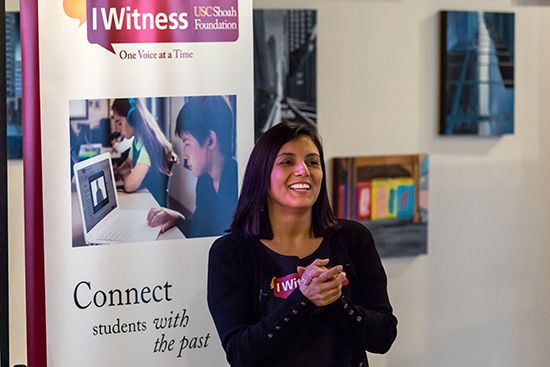100 Days to Inspire Respect Begins Today

Coinciding with Inauguration Day, USC Shoah Foundation debuts an initiative developed to quell some of the divides and intolerance exacerbated by the election. The 100 Days to Inspire Respect campaign starts today, its first week focusing on hate, and the power of storytelling and testimony in stopping it.
Modeled on a tradition established by former President Franklin D. Roosevelt when he assumed office in 1933 and instituted a sweeping agenda for his first 100 days in office, USC Shoah Foundation’s 100 Days is equally aggressive, aimed at educating high school upperclassmen and their teachers about hatred and intolerance with IWitness activities, academic resources and video testimonies from the Institute’s Visual History Archive.
Each of the 14 weeks of operation will center on one theme. The first week focuses on countering hate – the rest, respectively, on racism; civil and human rights; community; respect; intolerance; women and women’s rights; immigrants and refugees; cross-cultural understanding; courage; violence and violent extremism; indifference through media; resilience; and civic responsibility.
Activities will be released daily on IWitness by USC Shoah Foundation’s Education Department, to be implemented by participating teachers on weekdays. The shortest can be completed in 15 minutes with no teacher prep work required; the longest can take up to a week. In these activities, students will have the opportunity to produce videos, poems, images and word clouds; cultivate close-reading and comparison skills; watch clips of testimony and learn what the conclusion of unchecked hatred, racism and intolerance can be.
The first three days introduce testimony and story as a powerful tool to inspire respect and counter hate. Today’s activity is a Mini Quest called “My Story Matters: The Power of Story,” which will define hate and introduce students to the value of testimony and personal stories. The activity will engage students with testimony to understand how testimonies connect us and have the power to counter hate. The activity culminates in students creating their own stories.
Saturday will debut a new set of curated clips on the theme of hate on IWitness’s Watch page. The clips come from across multiple collections and experience groups in the Visual History Archive, including the Holocaust and Armenian Genocide. On Sunday IWitness will offer a new video aimed at middle and high school students called “What is Hate?” The video will help students understand the definition of hate and how it can manifest in society.
On Monday, the first week’s theme of “Countering Hate” begins. Students will study the topic of xenophobia by watching a collection of six clips of testimony from the Holocaust, wherein the survivors discuss their experiences with xenophobia as discriminated-against Jews or mistreated refugees.
The Mini Lesson released Tuesday is called “Listening and Speaking Skills/Freddy Mutanguha on Hate.” In this Mini Lesson, students examine the manifestation of hate and its impact through a close reading of testimony that engages them in learning to take the perspective of others different from themselves. Students do guided viewings of testimony from Freddy Mutanguha’s testimony, a survivor of the 1994 Genocide of the Tutsi in Rwanda and they participate in a reflective discussion.
Wednesday’s IWitness Mini Quest activity “My Story Matters: Experiences of Othering” focuses on the ways in which people are “othered,” or made to feel different and excluded.
Thursday’s released materials will have infographics that educators can use, with tips on how to teach with testimony to counter hate.
Similarly, Friday’s Information Quest activity “Hate and its Consequences” will help students define the concept of “hate” by having them watch testimonies that describe its manifestation and personal impacts, and then create a word cloud of words that might help counter hate.
Two activities will be released over the first weekend of programming – Saturday’s, an introduction to the IWitness Video Challenge; and Sunday’s, a Mini Quest activity “Countering Hate Through Testimony” devoted to students sharing what they’ve learned with their community by using social media and the #beginswithme tag to tell their stories.
While the 100-day program starts on the day of the presidential inauguration and thus is inherently political, according to The Daily Trojan’s interview with Kori Street, director of education at USC Shoah Foundation, the initiative doesn’t seek to take a side – it just means to start a conversation.
“Fake news, cyber-bullying and face-to-face bullying are all manifestations of rising divisions and rising hatred and racism,” Street said. “But I think it is important to note we are not focusing on political partisanship. This isn’t about the President-elect, it’s not about parties. It’s about saying, ‘You know what, we all need to be respectful and empathetic and knowledgeable and engaged.’ We need to find our way back to when we could have political or personal dialogue and differences without it descending into an inappropriate Twitter war.”
The program will run through Apr. 29.